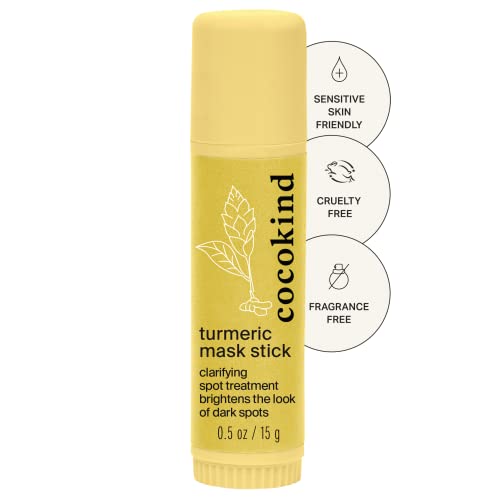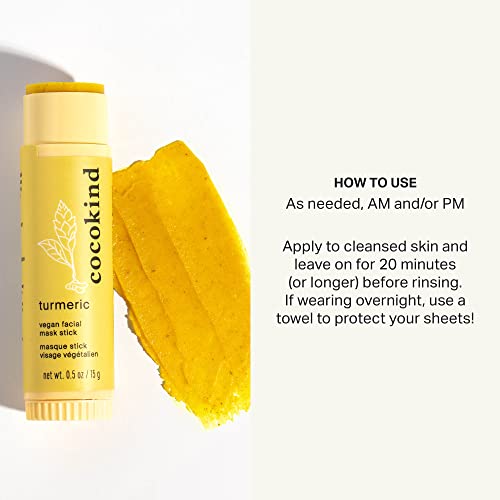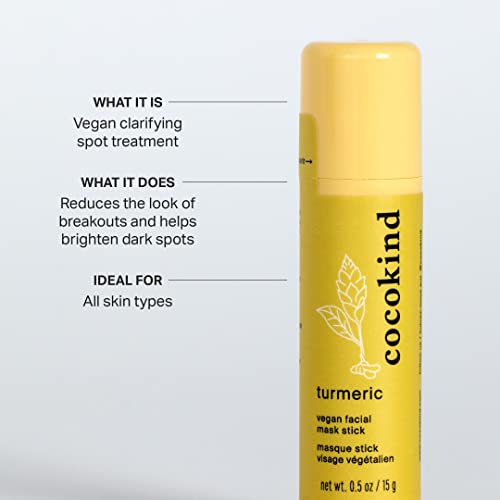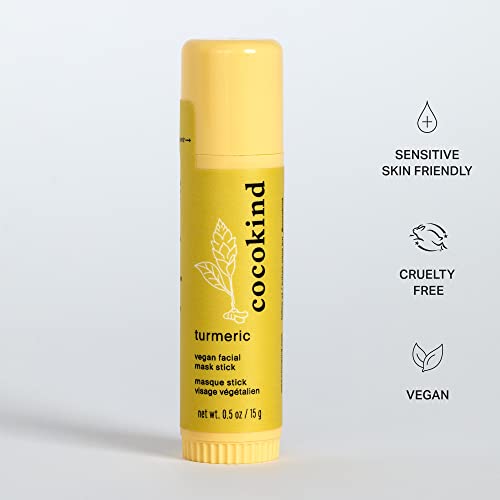





Cocokind Turmeric Mask Stick - Reduces Inflammation, Brightens Dark Spots - 0.59oz


Melaleuca Alternifolia (Tea Tree) Leaf Oil
Medium RiskMelaleuca alternifolia (tea tree) leaf oil is derived from the leaves of the Melaleuca alternifolia tree. It is commonly used in personal care products for its antiseptic and antimicrobial properties, making it a popular ingredient for skincare formulations.
Sustai Insights
Tea tree leaf oil offers functional benefits, including antimicrobial properties that can help with skin conditions. However, it has a high allergenic potential and may cause skin irritation or allergic reactions in sensitive individuals. Additionally, while it poses low to moderate risks concerning endocrine disruption and reproductive toxicity, it is restricted in certain formulations. Overall, the ingredient is assessed as medium risk, necessitating careful usage and consideration of alternatives for sensitive populations.
Helianthus Annus (Sunflower) Seed Wax
Low RiskHelianthus annuus (sunflower) seed wax is a naturally derived wax obtained from sunflower seeds, primarily used for its emollient properties in cosmetic formulations. It serves as a thickening agent, stabilizer, and moisture-retaining component, contributing to the texture and consistency of various products.
Sustai Insights
Sunflower seed wax offers functional benefits such as enhancing product texture and acting as a natural emulsifier. It is biodegradable and sourced sustainably, which aligns with eco-friendly practices. Health risks associated with this ingredient are low, with no significant concerns regarding carcinogenicity, allergies, or reproductive toxicity noted. Additionally, it does not pose environmental hazards, as it is not classified as a pollutant or bioaccumulative. Regulatory assessments indicate no current restrictions, resulting in an overall low risk level. Safe usage practices should be followed, and while alternatives exist, sunflower seed wax is a suitable option for many formulations.
Curcuma Longa (Turmeric) Root Powder
Low RiskCurcuma longa (turmeric) root powder is a finely ground powder derived from the roots of the turmeric plant. It is commonly used for its color and flavor in culinary applications and is also included in various cosmetic and health products for its potential benefits.
Sustai Insights
Curcuma longa has functional benefits such as anti-inflammatory and antioxidant properties, contributing to its use in health products. It is generally recognized as safe, with low risks for cancer, allergies, and toxicity. Environmental risks are minimal, with no significant pollutant potential. It is not on any restricted ingredient lists. Overall, the ingredient is considered low risk. Safe usage practices include ensuring proper concentrations in formulations, and alternatives include other natural colorants or anti-inflammatory agents.
Carthamus Tinctorius (Safflower) Seed Oil
Low RiskCarthamus tinctorius (safflower) seed oil is derived from the seeds of the safflower plant. It is primarily used in cosmetic formulations for its emollient properties, helping to moisturize and soften the skin. The oil is rich in unsaturated fatty acids and is often employed in skin care products for its potential benefits to skin health.
Sustai Insights
Safflower seed oil offers functional benefits as a moisturizer and emollient, contributing to skin hydration without significant irritation. It is generally recognized as low risk concerning health impacts, with minimal concerns over carcinogenicity, allergies, and reproductive toxicity. Environmentally, it poses low risks, being non-bioaccumulative and not a significant pollutant. Regulatory bodies do not impose restrictions on its use, underscoring its safety profile. While there are no widely recognized safer alternatives, users should ensure proper application to mitigate any potential skin irritation. Overall, this ingredient is assessed as low risk.
Polyhydroxystearic Acid
Low RiskPolyhydroxystearic acid is a polymer of hydroxystearic acid, commonly used as an emulsifier and stabilizer in various cosmetic and personal care formulations. It enhances texture and consistency, facilitating the blending of water and oil-based components.
Sustai Insights
Polyhydroxystearic acid functions effectively as an emulsifier, contributing to product stability and texture. It is considered low risk for health concerns such as carcinogenicity, allergies, and developmental toxicity. Environmental assessments indicate minimal pollution and bioaccumulation potential. Regulatory bodies report no current restrictions on its use. Safe usage practices should be followed, although sensitive individuals may experience irritation. Overall, the ingredient is assessed to have a low risk.
Zingiber Officinale (Ginger) Root Powder
Low RiskZingiber officinale (ginger) root powder is a powdered form of the ginger root, commonly used in culinary applications and traditional medicine. It serves various functions, including flavor enhancement and potential health benefits due to its bioactive compounds.
Sustai Insights
Ginger root powder is recognized for its functional benefits, including antioxidant properties and potential digestive support. It is sustainably sourced and generally considered safe, with low risks of cancer, allergies, or reproductive toxicity. Regulatory bodies do not impose restrictions on its use. While it poses minimal health and environmental risks, including irritant potential in sensitive individuals, overall risk is assessed as low. Safe usage practices should be followed, and alternatives like turmeric may serve similar purposes.
Helianthus Annuus (Sunflower) Seed Oil
Low RiskHelianthus annuus (sunflower) seed oil is derived from the seeds of the sunflower plant. It serves primarily as an emollient and moisturizer in cosmetic formulations, helping to maintain skin hydration and improve texture.
Sustai Insights
Sunflower seed oil is effective as an emollient, providing moisture and improving skin texture while being biodegradable and sustainably sourced. It poses low health risks, including negligible concerns for carcinogenicity, allergies, or reproductive toxicity. Environmentally, it does not significantly contribute to pollution or bioaccumulation. Regulatory bodies currently do not list any advisories for this ingredient. Overall, it is assessed as low risk, with safe usage practices recommended. Alternatives include oils like jojoba or almond oil for those seeking different properties.
Helianthus Annus (Sunflower) Seed Wax
Low RiskHelianthus annuus (sunflower) seed wax is a naturally derived wax obtained from sunflower seeds, primarily used for its emollient properties in cosmetic formulations. It serves as a thickening agent, stabilizer, and moisture-retaining component, contributing to the texture and consistency of various products.
Sustai Insights
Sunflower seed wax offers functional benefits such as enhancing product texture and acting as a natural emulsifier. It is biodegradable and sourced sustainably, which aligns with eco-friendly practices. Health risks associated with this ingredient are low, with no significant concerns regarding carcinogenicity, allergies, or reproductive toxicity noted. Additionally, it does not pose environmental hazards, as it is not classified as a pollutant or bioaccumulative. Regulatory assessments indicate no current restrictions, resulting in an overall low risk level. Safe usage practices should be followed, and while alternatives exist, sunflower seed wax is a suitable option for many formulations.
Curcuma Longa (Turmeric) Root Powder
Low RiskCurcuma longa (turmeric) root powder is a finely ground powder derived from the roots of the turmeric plant. It is commonly used for its color and flavor in culinary applications and is also included in various cosmetic and health products for its potential benefits.
Sustai Insights
Curcuma longa has functional benefits such as anti-inflammatory and antioxidant properties, contributing to its use in health products. It is generally recognized as safe, with low risks for cancer, allergies, and toxicity. Environmental risks are minimal, with no significant pollutant potential. It is not on any restricted ingredient lists. Overall, the ingredient is considered low risk. Safe usage practices include ensuring proper concentrations in formulations, and alternatives include other natural colorants or anti-inflammatory agents.
Carthamus Tinctorius (Safflower) Seed Oil
Low RiskCarthamus tinctorius (safflower) seed oil is derived from the seeds of the safflower plant. It is primarily used in cosmetic formulations for its emollient properties, helping to moisturize and soften the skin. The oil is rich in unsaturated fatty acids and is often employed in skin care products for its potential benefits to skin health.
Sustai Insights
Safflower seed oil offers functional benefits as a moisturizer and emollient, contributing to skin hydration without significant irritation. It is generally recognized as low risk concerning health impacts, with minimal concerns over carcinogenicity, allergies, and reproductive toxicity. Environmentally, it poses low risks, being non-bioaccumulative and not a significant pollutant. Regulatory bodies do not impose restrictions on its use, underscoring its safety profile. While there are no widely recognized safer alternatives, users should ensure proper application to mitigate any potential skin irritation. Overall, this ingredient is assessed as low risk.
Polyhydroxystearic Acid
Low RiskPolyhydroxystearic acid is a polymer of hydroxystearic acid, commonly used as an emulsifier and stabilizer in various cosmetic and personal care formulations. It enhances texture and consistency, facilitating the blending of water and oil-based components.
Sustai Insights
Polyhydroxystearic acid functions effectively as an emulsifier, contributing to product stability and texture. It is considered low risk for health concerns such as carcinogenicity, allergies, and developmental toxicity. Environmental assessments indicate minimal pollution and bioaccumulation potential. Regulatory bodies report no current restrictions on its use. Safe usage practices should be followed, although sensitive individuals may experience irritation. Overall, the ingredient is assessed to have a low risk.
Melaleuca Alternifolia (Tea Tree) Leaf Oil
Medium RiskMelaleuca alternifolia (tea tree) leaf oil is derived from the leaves of the Melaleuca alternifolia tree. It is commonly used in personal care products for its antiseptic and antimicrobial properties, making it a popular ingredient for skincare formulations.
Sustai Insights
Tea tree leaf oil offers functional benefits, including antimicrobial properties that can help with skin conditions. However, it has a high allergenic potential and may cause skin irritation or allergic reactions in sensitive individuals. Additionally, while it poses low to moderate risks concerning endocrine disruption and reproductive toxicity, it is restricted in certain formulations. Overall, the ingredient is assessed as medium risk, necessitating careful usage and consideration of alternatives for sensitive populations.
Zingiber Officinale (Ginger) Root Powder
Low RiskZingiber officinale (ginger) root powder is a powdered form of the ginger root, commonly used in culinary applications and traditional medicine. It serves various functions, including flavor enhancement and potential health benefits due to its bioactive compounds.
Sustai Insights
Ginger root powder is recognized for its functional benefits, including antioxidant properties and potential digestive support. It is sustainably sourced and generally considered safe, with low risks of cancer, allergies, or reproductive toxicity. Regulatory bodies do not impose restrictions on its use. While it poses minimal health and environmental risks, including irritant potential in sensitive individuals, overall risk is assessed as low. Safe usage practices should be followed, and alternatives like turmeric may serve similar purposes.
Helianthus Annuus (Sunflower) Seed Oil
Low RiskHelianthus annuus (sunflower) seed oil is derived from the seeds of the sunflower plant. It serves primarily as an emollient and moisturizer in cosmetic formulations, helping to maintain skin hydration and improve texture.
Sustai Insights
Sunflower seed oil is effective as an emollient, providing moisture and improving skin texture while being biodegradable and sustainably sourced. It poses low health risks, including negligible concerns for carcinogenicity, allergies, or reproductive toxicity. Environmentally, it does not significantly contribute to pollution or bioaccumulation. Regulatory bodies currently do not list any advisories for this ingredient. Overall, it is assessed as low risk, with safe usage practices recommended. Alternatives include oils like jojoba or almond oil for those seeking different properties.
Discover the transformative power of the Cocokind Turmeric Mask Stick, a natural spot treatment designed to target dark spots and acne. Infused with USDA Organic Turmeric, Tea Tree Oil, and Ginger Root, this face mask brightens and purifies skin while offering protection from environmental stressors.
- Natural Ingredients: Harness the benefits of Organic Turmeric Powder and Tea Tree Oil to reduce inflammation and enhance skin clarity.
- Easy Application: Simply twist the stick and apply directly to problem areas for a hassle-free facial treatment.
- Sustainable and Recyclable: This eco-friendly product is designed with sustainability in mind; recycle after use for a greener planet.
- Supports Healthy Skin: Packed with nourishing ingredients to maintain hydration and support your skin's barrier, promoting a healthy glow.
- Versatile Use: Ideal for a quick 20-minute treatment or overnight application, making it perfect for busy lifestyles.
Cocokind is committed to earth-friendly practices, ensuring that each product is crafted with care for both your skin and the planet.
Subscribe & Save with Sustai
- Best Price Guarantee: Always enjoy the lowest prices on sustainable home essentials.
- No Surprises: We’ll notify you before shipping. No hidden fees, ever.
- You’re in Charge: Change, pause, or cancel your subscription anytime with ease.
- Eco-Friendly Deliveries: Our grouped shipments mean less packaging and lower emissions.
Join us on a sustainable journey. Special offers for a limited time! Prices and promotions may change.
Recommended Products
Discover the transformative power of the Cocokind Turmeric Mask Stick, a natural spot treatment designed to target dark spots and acne. Infused with USDA Organic Turmeric, Tea Tree Oil, and Ginger Root, this face mask brightens and purifies skin while offering protection from environmental stressors.
- Natural Ingredients: Harness the benefits of Organic Turmeric Powder and Tea Tree Oil to reduce inflammation and enhance skin clarity.
- Easy Application: Simply twist the stick and apply directly to problem areas for a hassle-free facial treatment.
- Sustainable and Recyclable: This eco-friendly product is designed with sustainability in mind; recycle after use for a greener planet.
- Supports Healthy Skin: Packed with nourishing ingredients to maintain hydration and support your skin's barrier, promoting a healthy glow.
- Versatile Use: Ideal for a quick 20-minute treatment or overnight application, making it perfect for busy lifestyles.
Cocokind is committed to earth-friendly practices, ensuring that each product is crafted with care for both your skin and the planet.

You can have at most 2 Sustainable Steals products in your cart
Customer Reviews
Customers’ View
Customers appreciate the Cocokind Turmeric Mask Stick for its effective spot treatment capabilities and commitment to using organic ingredients. Many users highlight the product's ability to reduce inflammation and brighten dark spots, noting that the natural formulation feels gentle on the skin. The easy application process, where users can simply twist the stick to apply the mask, is frequently praised for its convenience. Additionally, consumers value the eco-friendly packaging, reinforcing their preference for sustainable products. Overall, the mask is seen as a reliable option for those seeking a health-conscious skincare solution that aligns with their environmentally friendly values.
AI-generated from the text of customer reviewsThis product has no reviews yet.





